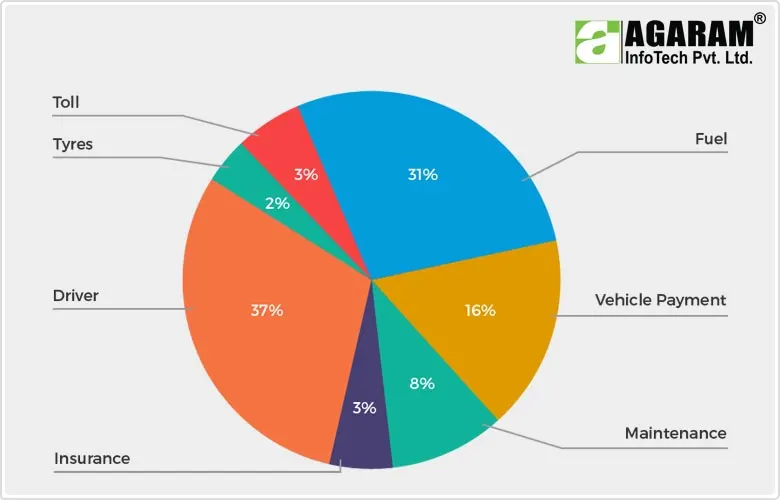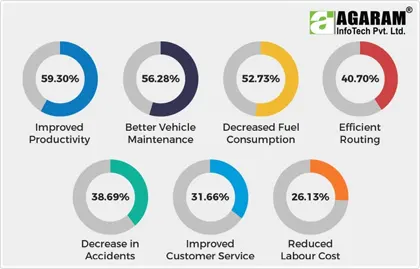The exact calculation of logistics costs is a real challenge in logistics and supply chain management. For efficient resource allocation in your logistics business it is highly essential that you have reliable and accurate costing information. The figure below shows the different components of logistics operational cost.

Here we find that logistics fuel expenses, driver expenses, vehicle costs and maintenance are the major factors that contribute to the logistics operational cost. When we discuss about these different expense components the one common consideration would be Wheel Time. This can be best described as the number of hours the vehicle/carrier has been running on road. This wheel time is the sum total of hours the vehicle is operational on road, this excludes the time spent at toll-booths, time consumed for filling fuel, time when the vehicle is parked as the driver takes break, etc. The Vehicle wheel time determines the logistics fuel expense, the number of productive hours the drivers have been functioning, the vehicle wear and tear due to usage and the resultant maintenance required. With the wheel time being an important deciding factor of the operational expense, it is natural that minimizing the wheel time along with ensuring timely delivery of goods would be the ultimate motive of any logistics service.

Decreasing your fleet’s running hours would result in
However for any logistics provider acquiring accurate data about the wheel-time of his fleet is very difficult. There are many scenarios where vehicle operators engage in activities which misrepresent facts and result in business overheads.
Considering the above mentioned facts, it becomes imperative that a constant mechanism to monitor the vehicle and track its route be engaged to acquire the correct vehicle wheel time data. This would ultimately result in better fleet management and decrease your logistics operational cost.
Minimizing vehicle wheel time starts with obtaining the whereabouts of your fleet and driver and getting more control over your business. All you need is an efficient Fleet Management System solution that would provide your industry with accurate information on location, tracking, route, fuel level, engine idling, timely alerts for crucial parameters including over speeding, unscheduled diversions, accidents and incidents, and improper driver behaviour. FMS achieves this through vehicle tracking using GPS / GPRS integration.

The impact and the importance of vehicle tracking for logistics industry is immense. Using GPS / GPRS tracking of vehicle you can potentially obtain both real-time and historic navigation data on any kind of journey. It not only tracks the exact location but also computes the vehicle velocity and time. You can easily and accurately locate the whereabouts of your vehicle and their routes enabling you to chart the most optimal route for delivery and at the same time accommodate the last minute customer requisitions which fall in the planned route. Our aim of reduction of vehicle wheel time can be easily achieved with GPS tracking of your vehicle.
There are many added advantages this technology brings to your organization.
Charting out the optimal route for deliveries keeping in mind the various geographical constraints, bottle necks and accommodating even sudden unexpected issues on route is achieved through GPS tracking. This in other words is the reduction of your fleet’s wheel time with assured on-time delivery. With digital technology already making inroad into the Logistics industry, it’s time you make the right change which assures your fleet reduced vehicle wheel time, maximum throughput, on-time deliveries and reduced logistics operational cost.